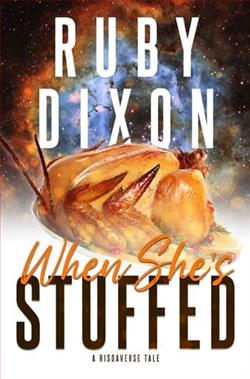Page 18 of The Someday Daughter
“Let’s find our centers,” she continues, and he points to his stomach. Then he points to Puddles’s. “Breathe deeply, letting your belly expand with every inhale.”
We’re still looking at each other—the only living things on this rooftop with our eyes open—when my mother says, “Let’s center ourselves before tonight’s show. Let’s become grounded in our bodies so we don’t feel the urge to flee, or to clam up when the moment calls for our presence.”
I press my eyes shut, cheeks flaming. She’s calling me out, barely any coding to it, right here in front of everyone. I can’t believe her—except that of course I can. This is the story of our whole entire relationship: there is the outward language, and there is the subtext.
I know Silas is still watching me, but I keep my eyelids pressed shut and hope the darkness behind them will swallow me alive.
“Let’s honor our own wholeness,” my mother says. And one last drive of the knife: “Let’s remember who’s relying on us to show up tonight, just as we are.”
So I show up as I am. And I am raging.
Because when Camilla says “as we are,” she means: Camilla St. Vrain, beloved wellness guru, and her doting, openhearted, here-for-the-psychobabble daughter. She means: let’s show the world how perfect it is, up here where we sit. She means: let’s preach about self-love when we can’t even be honest about the broken way we love each other.
But that’s not as we are. We are as unknown to each other as two people can be. I know the freckles on my mother’s shoulders and the blue of her eyes and all the parts of her that are mine. But I don’t know what that book dedication means—To her—and I don’t know why she brought me here.
There was nohernamed Audrey back then. There is no part of me she knows well enough to speak to unless it’s in a social media caption. I realize, sitting under the stage lights in yet another floral dress, that I didn’t say a single word to anyone during this morning’s yoga session. That I’ve let all of this happen to me; that I’ve been letting Camilla justhappento me for my entire life.
“Audrey,” the moderator says. We’re at a packed theater dripping in Spanish tile. It’s the most beautiful space I’ve ever been in, and the last place that deserves my anger. But it’s where I am. As I am. “What’s it been like for you to be a part of theLetterstour so far? To join this movement publicly for the first time?”
I look at Camilla before I say it, think of her big inhale in her Saint-logo’d yoga outfit, imagine how it felt walking out of my dorm room sophomore year to find her in that hallway, turning the worst time of my life into a publicity stunt. I look back at the moderator. I show up as we are.
“It’s been absolutely horrible.”
The truth is like a free fall: for a moment there’s nothing to hold on to, just the euphoric rush before the concrete rises up. Saying it out loud feels like releasing a dam in my chest. Everything rushes out, wrathful, a relief.
Behind the moderator’s astonished expression I see Silas at the edge of the stage, camera in front of him. He ducks out from behind it to look at me, his lips parted in surprise. Cleo and Mick stand in the half-dark just past him, but I don’t have time to clock their reactions before my mother’s hand falls to my wrist. Her laugh is like wind chimes, warning of a coming storm.
“Oh, Audrey, honestly.” She smiles at the moderator, at her adoring fans. “She doesn’t mean that. She means—”
“I do mean that.”
We look at each other, and it’s like I’m watching her scramble, play catch-up, figure out how to fix me.
In the held-breath pause, I keep talking. “I had plans for this summer, but instead I’m ‘joining this movement publicly.’”
“The public piece is hard,” my mother says slowly, her eyes still on mine. I watch the shift: something in what I’ve said has given her an idea, and she’s turning this around. She faces the moderator.
“There’s a big difference between living a private life and suddenly feeling like a public figure. We’re human, too.” Her hand isstill on my wrist, and she squeezes it. “This is Audrey’s first experience with the blurring of that line, the careful tightrope walk of a public life when we are all inherently private people.”
This isn’t my first experience—it’s not even close to my first experience. My first experience happened before I could form memories, when my baby picture racked up over a million likes on her social profiles. My second was a day after that. All my others in all the years that followed. My whole life has been a careful tightrope walk that I’m one swift breeze from toppling off of.
But Camilla built the tightrope herself, and nothing I can do, it’s clear, is enough to knock her off-balance. She’s already running at full steam, regaling her audience with a psychotherapeutic exploration of what it means for us to have public and private personas. She’s already buried me in my one attempt to gasp for air.
When my eyes drift to Silas, he’s back behind his camera. But he lifts his free hand and points to his stomach.Let’s find our centers.I close my eyes, and I count my fingers, and I do.
15
Sadie saves me the next morning, her knock at the door of my hotel room like the response to an SOS I never sent.
“Yes?” Magnolia calls. She and Camilla are sitting on the bed across from mine, side by side like they’ve been my entire life.
“It’s Sadie.” Her voice is muffled by the door. “Audrey and I need to leave for our Desert Winds appointment.”
Desert Winds: the mental health rehabilitation facility whose website makes it look more like a spa than a treatment center. Not at the top of my list, but I’ll take any excuse to get away from Camilla.
When Magnolia rises to open the door, my mother looks at me.
“I just don’t understand why you’d bring it up that way in public,” she says. We’ve been circling this drain for the last thirty minutes—her and Magnolia’s Big Intervention after I took my own rideshare back to the hotel last night and hid from them in my room. I was supposed to video chat with Ethan, but I told him I wasn’t feeling well and lay in bed with all the lights on instead. Dad has texted twice and called me three times, but I still haven’t responded. “If you’re upset, Audrey, you know you can always tell me.”















